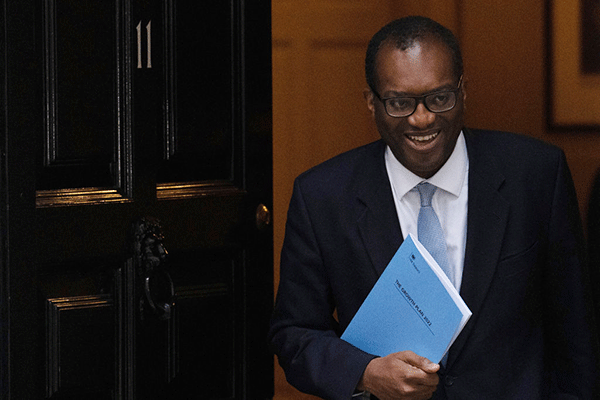Kwasi Kwarteng’s explosive mini-budget 2022: winners and losers
23rd September 2022 11:47
by Alice Guy from interactive investor
We round up the huge changes announced in Kwasi Kwarteng's mini-budget, explain the winners and losers and how measures will impact your wallet.

Kwasi Kwarteng’s mini-budget is even bigger and bolder than experts were predicting. Ripping up the rule book, Kwarteng announced huge and wide-reaching tax cuts that will have a lasting, if yet unknown, impact on the economy.
The tax cuts are aimed at stimulating the lacklustre UK economy and fighting off a looming recession: Kwarteng is aiming for 2.5% annual growth.
Winners
Householders and homeowners
- Energy: Kwarteng confirmed a hugeenergy support package for households as energy bills are capped for two-year period at £2,500 for an average household. A typical household will save around £1,000 at current rates, with an additional £400 rebate to be paid during this winter. Vulnerable households will also have extra support through measures already announced.
- Stamp duty: Kwarteng announced a cut to stamp duty, as the tax-free threshold is raised from £125,000 to£250,000 for house-buyers in England and Northern Ireland. First-time buyers will have no stamp duty to pay on houses worth up to £425,000, rather than a previous £300,000. The measure will take more than 200,000 buyers out of paying the tax, according to government figures. This cut starts today and is permanent, unlike the previous stamp-duty holiday.
- Housebuilder shares yo-yo as investors react to stamp duty cut
Workers
- Income tax: the additional rate tax of 45% will be abolished from April 2023 and there will be one higher-rate tax threshold of 40%. The chancellor also announced a cut to basic-rate income tax from 20% to 19%, a move which will give someone earning £30,000 an extra £174 per year. Higher earners on £50,000 will save £374 income tax, while a top earner on £200,000 will save £2,877 per year. This change won't affect taxpayers in Scotland.
- National Insurance: Rishi Sunak’s previous 1.25% National Insurance hike will be scrapped from 6 November, bringing National Insurance down from 13.25% and 3.25% to the previous levels of 12% and 2%. This will save someone earning £50,000 around £468 per year.
Businesses
- Energy support: business owners can breathe a massive sigh of relief as they will also see their energy bills capped at a similar level to price cap for households, although actual figures will depend on usage.
- Corporation tax rise: Kwarteng confirmed that the planned Corporation tax rise from 19% to 25% won’t go ahead in April 2023, saving a business with taxable profits of £2 million around £120,000 per year.
- Infrastructure: Kwarteng revealed plans to streamline the process for approving new infrastructure projects and to increase the governments’ disposal of land for building new homes. Addressing planning, Kwarteng said the current system is too slow and announced plans to bring forward a bill “to unpick the complex patchwork of planning restrictions and EU-derived laws that constrain our growth”.
- Other business changes: the chancellor announced plans for new investment zones in 40 areas with incentives such as, “accelerated tax reliefs for structures and buildings and 100% tax relief on qualifying investments in plants and machinery, on purchases of land and buildings for commercial or new residential developments”.
- More announcements due: there will be announcements in the coming weeks covering the planning system, business regulations, childcare, immigration, agricultural productivity and digital infrastructure.
Bankers
- Bankers’ bonuses: Kwarteng confirmed that he will remove the current bankers’ cap, which he argues drove up total pay and didn’t cap total remuneration as planned.
- Financial regulation: the chancellor also announced plans for a review of financial regulations with a view to reducing the amount of red tape.
Shoppers
- Alcohol:Kwarteng says the planned increases in duty rates for beer, cider, wine and spirits will be cancelled.
- Tourists: the chancellor announced plans to scrap VAT for tourist visiting the UK.
Investors
- Dividend tax increase to be reversed: the 1.25 percentage point increase in the dividend tax will be reversed next April.
- Venture Capital Trusts (VCTs) will be extended beyond 2025: such funds are designed as a means to direct capital to early stage businesses, while also giving investors a juicy tax break.
- The funds set to benefit from Liz Truss’ spending splurge

Losers
Low-paid and unionised workers
- Universal Credit: the chancellor plans to introduce more checks for people working part time and claiming Universal Credit, aiming at proving claimants are actively seeking work.
- Strike action: Kwarteng announced plans to make it harder for British workers to go on strike, with unions needing to put pay offers to a vote.
Wider economy
Although there are more immediate winners in this mini-budget, there could be losers in the medium term as the financial impact of the policies ripples down to the wider economy, potentially affecting us all.
The main aim of the budget is to stimulate growth and lift the UK economy from the mire of stagflation. Kwarteng aims to deliver 2.5% growth and promote, “higher wages, greater opportunities and crucially fund public services, now and into the future”.
But achieving 2.5% is not a slam dunk for the chancellor. Critics argue that going for broke is likely to stoke the red-hot fires of inflation and could lead to more interest rate rises down the track. If that happens, then any short-term growth achieved could be short-lived.
- Reaction to Bank of England's big interest rate hike
- Do British prime ministers influence economic growth?
Government debt is also likely to hit record levels and critics argue taking on more debt is a big gamble. We will have to wait to get costings on all the government policies announced, but the energy package alone will cost £60 billion over the next six months, according to government calculations.
Kwarteng confirmed the ongoing independence on the Bank of England saying that, “this government considers the Bank of England’s independence to be sacrosanct”.
Stock markets
The markets responded negatively this morning with the FTSE dropping 1.49% and the pound dropping further against the US dollar.
Economists were critical of Kwarteng’s decision not to allow the Office for Budget Responsibility (OBR) to review the mini-budget: a decision which has made it very difficult for economists to review and analyse the figures.
- How to invest during a recession: top tips and tactics
- The investments that will keep growing – even during a recession
Mel Stride, chair of the Commons Treasury Committee and an ally of Rishi Sunak, said independent forecasts from the OBR were necessary to “provide reassurance and confidence to international markets and investors”.
He said: “As a committee, we have in the past reported to the House that we consider it very important that significant changes to taxation are announced in a fiscal event alongside an OBR forecast. These forecasts are a vital indicator of the health of the nation’s finances, and provide reassurance and confidence to international markets and investors.”
With so many huge changes announced, it may take time for the markets to digest the news and more will become clear in the coming days as details emerge on the cost of government policies.
These articles are provided for information purposes only. Occasionally, an opinion about whether to buy or sell a specific investment may be provided by third parties. The content is not intended to be a personal recommendation to buy or sell any financial instrument or product, or to adopt any investment strategy as it is not provided based on an assessment of your investing knowledge and experience, your financial situation or your investment objectives. The value of your investments, and the income derived from them, may go down as well as up. You may not get back all the money that you invest. The investments referred to in this article may not be suitable for all investors, and if in doubt, an investor should seek advice from a qualified investment adviser.
Full performance can be found on the company or index summary page on the interactive investor website. Simply click on the company's or index name highlighted in the article.